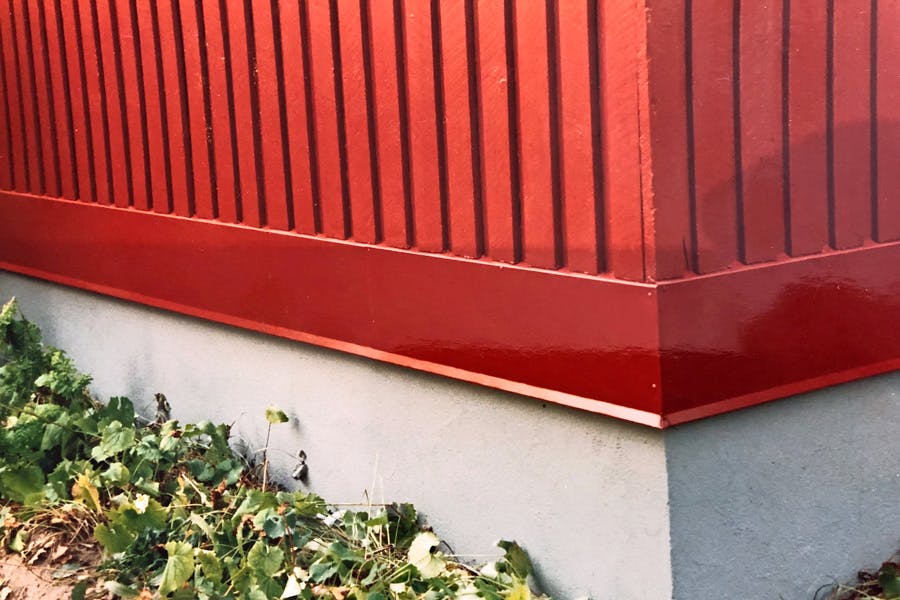I recently bought my first house and I noticed some rot happening beside our garage door. It appears that when the cement driveway was poured, they got too close to the siding and now water is wicking up into the wood. I figure I can cut back the siding and replace it but how do I stop this from happening again?
Once it’s rotted, you need to replace. This will also give you the opportunity to look at the wood behind the siding as there’s a good chance that the rot goes deeper.
You never want to have untreated wood touching concrete. Concrete will always wick water and rot the wood. When you replace the siding, leave a 3/8in gap between the wood and concrete. Seal the gap with caulk to keep water out.
I agree, just be careful with the caulk- sometimes you end up sealing liquid (or vapor) water IN instead of out. If you have good overhangs it’s probably fine but don’t do this below a window or other opening.
And for anyone wondering about concrete wicking water, look up ‘capillary break’
I was worried about sealing in water/moisture. I think I’m going to leave it until the rainy season is over and then open it up to see what is behind there. Hopefully the structure is ok.
Leave a gap between the concrete and the siding, so that the water can run away/evaporate before it reaches the wood. Also make sure that the water flows away from the siding when it rains, and not up against it.
There should be a small slope away from the siding, so the water is not retained there, but leads away to avoid further damage to the siding/construction.
In Norway where I live, all houses have a clearing of 2-3 cm at least between the concrete and wood, and the floor is made so the water runs away from the building to avoid exactly this issue, because of the amount of rain and sometimes melted snow during the seasons. It’s part of the building code for houses.
Best of luck to you in getting this sorted out, make sure you get all the damaged parts out, so you avoid secret problems later on.
If I leave a gap, what is to prevent water from running in behind the siding? The cement is sloped away from the house but there is no overhang so it does get wet.
If there is a slope the water will not run upwards, and the water on the siding should run down to the ground and away as well. The siding panels should also be painted with outdoor paint also on the bottom so the water cannot penetrate in the cuts at the bottom of the siding. The small amount of time before it drains away will not cause it to rot as long as it’s treated in all the cuts, it’s the still water over time that causes the wall to rot.
Or do you mean there is nothing else behind these boards, so if you cut them there will be an open gap between the siding and the concrete?
if it’s the last one, you can add an aluminum fitting to the end of the siding, or a fitting of some other material that handles outdoor conditions. By doing this you hide the end of the wall from the elements, it is durable, easy to replace and if you choose the right one it can look good as well. This will also enable you to just remove the rotten part in the bottom of the siding, unless the rot has spread deep or high in the construction, as the fitting will close and blend the cutter part. Just make sure to leave a small opening at the bottom of the fitting, to let the water escape, or you can seal it properly, as the fitting will not take water damage like wood, and is more easily to replace if needed.

example picture of a wall where fittings have been applied to a wall with the same type of issue with rotting sidings, the principles are the same, though the issue in this case is further up.
It’s from this article, it’s in Norwegian, but you should be able to translate it using Google translate if it’s something you want to read.
https://gjoerdetselv.com/hus/fasade/kledning/skjul-ratne-kledningsbord
I would replace it with something that doesn’t rot, like Hardie Sierra 8. It’s expensive, but if installed correctly it’ll last forever.
It’s ABSURDLY expensive. Just do vinyl.
Vinyl has the same curb appeal as a toothless meth addicted prostitute.
Hey! No kinkshaming!
/S
With epoxy-based putty or paste. Take a tool and dig out as much rot as you can. There’s a two part epoxy you can get that goes on either as a paste or a putty.
For the paste, you’ll need to build it up over a few coatings. For the putty, you can form it like play-doh.
Use batons to form it or get it in rough shape and then use planers, very sharp chisels and/or sandpaper to shape it. I typical do the shaping when the epoxy is not 100% cured but rather, 60%-80%. Easier to shape.
Once in the correct shape, allow to cure and paint.
Don’t use liquid epoxy. Unless you have a 100% fool-proof seal, you’ll make a mess. Hell, you’ll probably make a mess even with one.
Good luck!
Replace the bottom few inches with Hardie Plank
If you do end up replacing just a bottom portion, be sure you use some Z-flashing so that rain water can’t get behind the seam. As mentioned, use something that won’t rot. I also recommend using Hardie Sierra 8 to replace entire sections, I have it on some portions of my house along with T1-11 and they compliment one another as long as they are not side by side.
Save up or arrange financing and replace all of it. Hopefully you don’t have hidden rot elsewhere…




